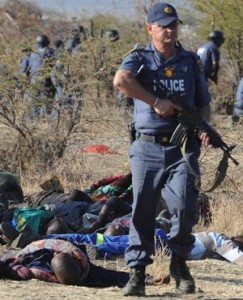By Tara Pistorese
Impunity Watch Reporter, Africa
PRETORIA, South Africa—Police, armed with automatic rifles and pistols, opened fire on a crowd of 3,000 workers of the Lonmin mining firm on August 17, killing 34 and injuring 78. The incident has been called the most lethal police action since the end of apartheid.

The miners had been on illegal strike for six days in an effort to have their wages raised from 4,000 rand per month (approximately $484) to 12,000 rand per month (approximately $1512). Bearing spears, traditional fighting sticks, and machetes, 250 miners were arrested for public violence. They are expected to appear in court soon.
“We are angry,” said a victim’s family member. “Why must people be killed because they are protesting?”
Mangwashi “Riya” Phiyega, the newly appointed Police Commissioner, said officers were acting in self-defense when they fired on the miners after they had attempted to dilute the crowd with tear gas, water cannons, and rubber bullets.
While the circumstances surrounding the tragic event are somewhat unclear, some witness accounts suggest the shooting was a response to the workers rushing a line of police officers.
On the Wednesday following the shooting, President Jacob Zuma spoke with a crowd of survivors, informing them that the government had no intentions of killing anyone that day. The crowd reacted by shouting “phansi amaphoyisa phansi,” which means “down with the police.”
President Zuma has been criticized for his handling of the situation, which has had a critical impact on the nation’s investors. Financiers have previously expressed distrust in the nation’s legal system in light of statistics showing the country suffers 43 murders each day, which is more than six times the murder rate in the United States.
The tragedy “will make it more difficult for South Africa to attract foreign investment,” Carmen Altenkirch, a sovereign analyst at Fitch Ratings in London, told Bloomberg.
South Africa is one of the largest platinum producers in the world and the nation’s economy relies on mining of resources for almost two-thirds of its exports. The day news of the massacre was released, the rand fell 1.8% against the dollar.
President Zuma created a judicial inquiry and committee of cabinet ministers to investigate and take action against those responsible, if necessary. However, he has publicly announced he will not terminate Phiyega.
“We need answers,” said Julius Malema, a spokesperson for the mineworkers. “I don’t trust President Zuma and his inquiry.”
President Zuma has declared a week of national mourning from August 20 through 26. Flags across the country and at missions outside South Africa’s borders will fly at half-mast this week.
Lonmin threatened surviving workers with dismissal, however, if they failed to return to the job by August 20.
For further information, please see:
Mail & Guardian Online—Zuma on Lonmin: Government Didn’t Plan to Kill Anyone—22 August 2012
Bloomberg—Zuma Rejects Criticisms of Handling of Lonmin Mine Deaths—22 August 2012
Mail & Guardian Online—Deep Read: In the Eye of the Lonmin Storm—20 August 2012
BBC News Africa—S. Africa Lonmin Killings: National Mourning Declared—19 August 2012